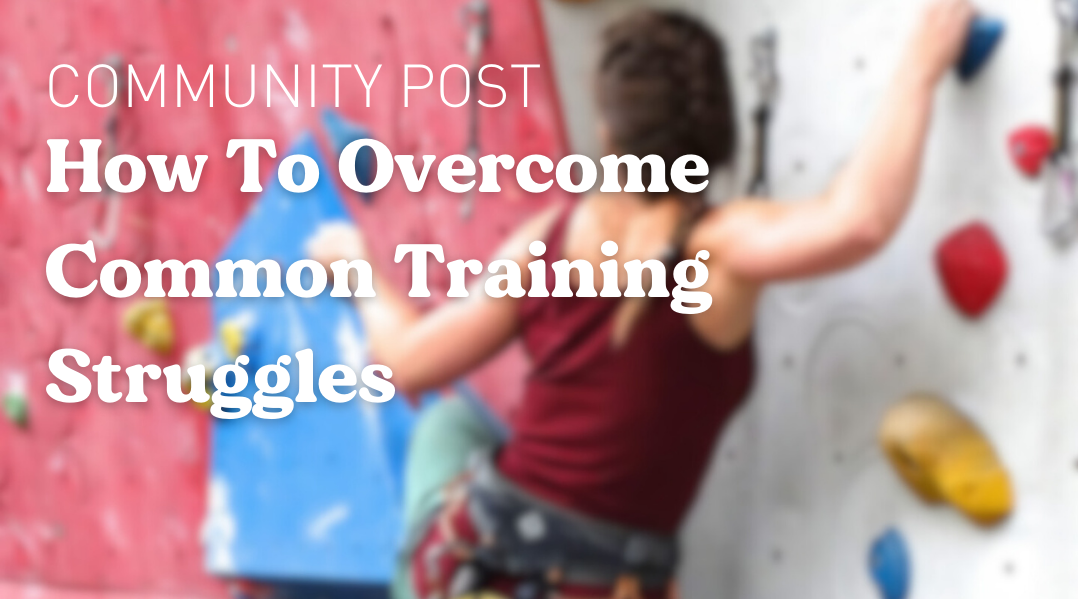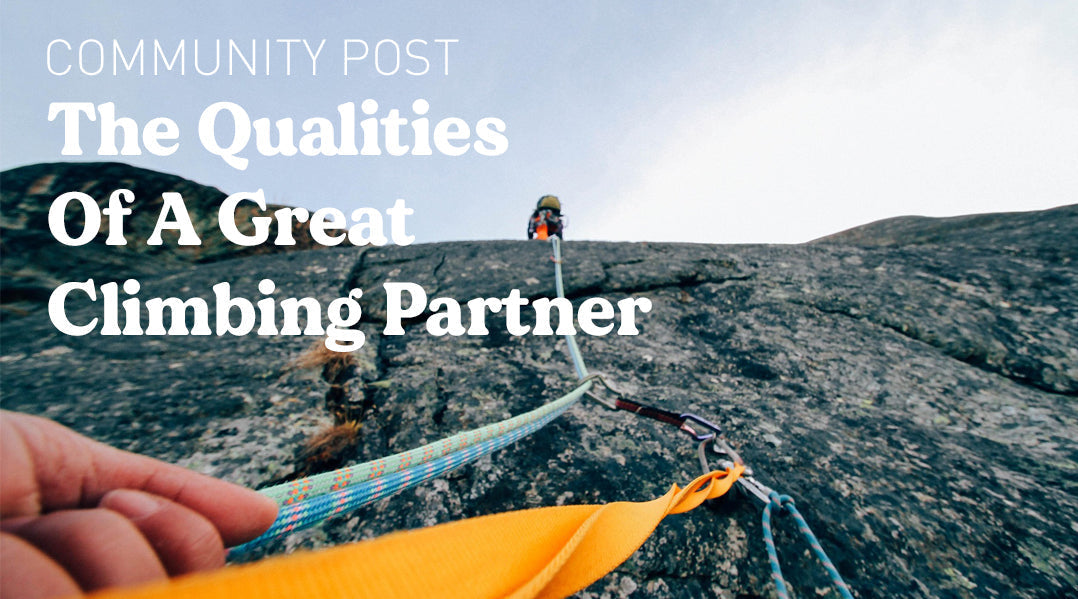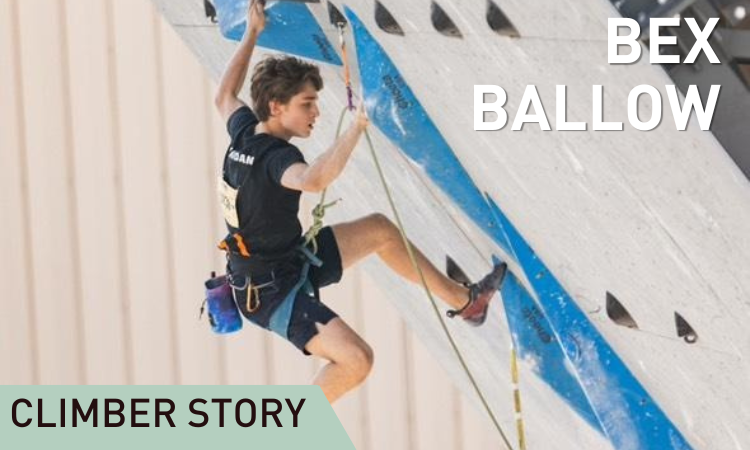Your Cart is Empty
DYNAMITE STARFISH'S ONLINE STORE IS CLOSED AS OF DEC 1, 2026. ask your local gear shop or climbing gym if they stock our products.
DYNAMITE STARFISH'S ONLINE STORE IS CLOSED AS OF DEC 1, 2026. ask your local gear shop or climbing gym if they stock our products.
How To Overcome Fear In Climbing
February 21, 2024 5 min read

It was a warm summer day in the North Carolina High Country where we found refuge from the sun on the shady slopes of Grandmother Mountain.
I was working a line called Klamper on the famous Mighty Mouse boulder. After sussing out the lower sequence, I decided I should run the top out before giving it a send attempt.
The boulder is on the taller side, but I managed to keep it together as I worked my way over the lip. I walked to the top yelling, "How do I get down from here?!"
I could feel my sense of calmness giving way to panic. My wife tried to reassure me by showing me how to climb (and down climb) the adjacent V0, but it was no use.
The tingling sensation was spreading through my limbs as I began to hyperventilate with tears flowing down my face — talk about a place to have an anxiety attack.
The episode was so draining that I fell asleep on top of the boulder for 30 minutes before mustering up the courage to make the downclimb.
Why did this happen? How could a 'competent' climber be so afraid of something seemingly so easy? Where did it come from?
It took a lot of self-reflection to accept that fear has a funny way of manifesting itself. Fear in climbing is normal and each of us has our unique way of handling it.
If you can relate, scroll on as Dynamite Starfish community members share their experiences on how to overcome fear in climbing.
You don't need to complete the climb
Outside of comps, one of the most beautiful things about climbing is that there really are no hard-and-fast 'rules'.
Sure, there are ethics that many folks agree on, but it's ultimately up to the individual to define how to climb from point A to point B.
Not enough pads or spotters to confidently top out? Staring at a huge run-out up to the anchor? No problem.
As great as it is to complete a climb, there's no need to do it if you're getting bad vibes. Your friends will still be your friends if you decide to come down.
And don't forget that you can always give it another go. "Just climb to where you're comfortable. Each time try going one hold further." @shaun.climbs
Don't try and overcome it
Thinking back to my episode on Grandmother Mountain, there are a few things I could have done differently. My partner and I knew to check the downclimb before committing to a high top out, but panic attacks while climbing were a whole new territory.
Instead of rushing to get back to the ground, I should have taken this advice:
"Acknowledge your fear, talk about it! Take, let your partner know that you are afraid. Chat about potential "dangers", then try and pull on and do the move even if you feel scared!" @tashofthewasatch

(Photo of Natasha courtesy of @jonvickersphoto)
This wasn't the last boulder I got stuck on (oops..), but it did teach me to accept fear and chill out at the top for however long I need to feel comfortable again!
The next time you feel your anxiety building inside, try this:
"Pause, breathe, find balance in your body, make the next move, one move at a time." @threeschuhs
Celebrate your small wins to build up confidence
Alex Honnold didn't wake up one morning and casually decide to free solo 'Freerider' in Yosemite. It took years to build up the technical skills, logistical know-how, and mindset required for +3,000ft of ropeless climbing.
While we certainly don't promote free soloing, the lesson here is to create a foundation of confidence found in small wins as you work towards the bigger goal.
Did you finally take a fall on lead? That's awesome! Did you dyno for the jug instead of saying "No way José!" and giving up? Fantastic!
These are all steps in the right direction. Be proud. Celebrate. You got this!
(Photo courtesy of @erendeavor)
Climb with friends from different levels
You probably understand the importance of having an experienced mentor, but have you ever spent time climbing with folks who have a lower level than your own?
Hitting the rocks with a strong, lifelong climber has a lot of advantages especially when it comes to familiarity with safety protocol or simply having better technique and strength to show you how to pull a move. However, being a total crusher doesn't always equate to being a great partner or 'coach'.
On the flip side, climbing with newer climbers makes you the mentor. Giving advice and talking to others about overcoming fear might be that positive self-reinforcement you've been needing in your own climbing!
Both V17 and 5.Fun! climbers will have unique perspectives on fear and anxiety. Be open to learning no matter what grade someone climbs. And who knows...you might just make a new climbing bestie in the process!

(Photo courtesy of @izayeeee)
Practice falls forever
Before journeying into rock climbing, I racked up 10 years of experience as a gymnastics coach working with levels spanning from preschoolers to collegiate athletes.
One of the very first things we would teach children was how to fall safely — slight bend in the knees, arms tucked inwards, and roll on landing.
Boulderers can practice this skill indoors by falling from different heights or angles of overhang. Similarly, you can practice taking whippers from various distances above your previous quickdraw. Up your head game by having a partner yell 'fall' to simulate an unexpected foot slip.
Falling in rock climbing is inevitable and knowing exactly what it feels like in a controlled setting does wonders for your confidence!
(Photo courtesy of @_chessur and @callynfrancisco)
Pro Tip: Take responsibility for checking pad placement for gaps, sliding, and uneven surfaces in fall zones before each go when bouldering outdoors.
Know what to do if something goes wrong
Rock climbing isn't all sunshine and happy sending. Things will go wrong and it's extremely important to take time to plan how you'll react in different situations.
Make it a habit to communicate out loud with your partner while tying into your harness and building anchors to rappel off a route. Talk about peculiarities including awkward sections of climbing or potential hazards such as trees, unleashed animals, excess noise, or nearby climbers.
"Knowledge of falling techniques, rope positioning, my own limits, and my surroundings set the tone for a positive climbing experience whether I'm at the gym or outdoor crag." @ellemcdawnwalled
Be kind to yourself
Remember that little story from earlier? I was retelling it to a group of local climbers while visiting in 2022 when one smirkingly said, "Yeah, you can also just hop 2 feet over to the next boulder and walk right off...."
Needless to say, this event turned into one of my most laughable 'oops' moments in climbing!
The next time you find yourself struggling to overcome your fear monsters, remember this:
"Don't try to soldier through and pretend you're not scared. Embrace the fear and learn to push through it with intention and self-compassion. Don't take your time, but don't be lazy with it either. I find that it takes a lot of time to figure out the balance." @thatclimberavi

What about you? Have you had a similar experience? How do you overcome fear in climbing?
Share your thoughts in the comments below. We'd love to hear from you!
Psst…Our tees are a great conversation starter!
With so many styles, we know you’ll be the climber having the most fun at the crag.
SHOP OUR UNISEX CLIMBING APPAREL:

Leave a comment
Comments will be approved before showing up.
Also in News

The Climbing Training Struggles You Can’t Ignore (And How to Overcome Them)
March 19, 2025 6 min read
Read More
Building Trust and Teamwork: Qualities of a Great Climbing Partner
February 12, 2025 4 min read
Read More Recent Articles
- The Climbing Training Struggles You Can’t Ignore (And How to Overcome Them) March 19, 2025
- Building Trust and Teamwork: Qualities of a Great Climbing Partner February 12, 2025
- Climber Story: Bex Ballow January 29, 2025
- 9 Climbing Resolutions for 2025 December 31, 2024
- Climber Story: Kanani Kalahiki December 11, 2024
- 12 Awesome Gift Ideas for Climbers in 2024 November 20, 2024
- Climber Story: Nick Ranelli November 06, 2024
- If climbing was a scary movie, this would be the title... October 30, 2024
- Climber Story: Britney Berkstresser October 02, 2024
- The best (and worst) names for climbing routes we've ever seen September 25, 2024
Subscribe
Sign up to get the latest on sales, new releases and more …
want 15% off?
Get a welcome gift when you sign up with us!


